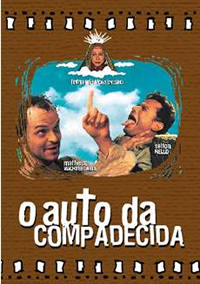O Auto da Compadecida
| A Dog's Will | |
|---|---|

Theatrical release poster
|
|
| Directed by | Guel Arraes |
| Produced by | André Cômodo |
| Written by |
Adriana Falcão Guel Arraes João Falcão |
| Based on | Auto da Compadecida by Ariano Suassuna |
| Starring |
Matheus Nachtergaele Selton Mello Fernanda Montenegro |
| Music by | Grupo Sá Grama Sérgio Campelo |
| Cinematography | Felix Monti |
|
Production
company |
Globo Filmes
Lereby Produções |
| Distributed by | Columbia Tri Star |
|
Release date
|
|
|
Running time
|
104 minutes |
| Country | Brazil |
| Language | Portuguese |
| Box office | R$11,496,994 ($4,903,192) |
A Dog's Will (Portuguese: O Auto da Compadecida, which literally means "The Compassionate Woman's Play", the woman being Virgin Mary) is a 2000 Brazilian comedy film, directed by Guel Arraes, with a screenplay by Arraes, Adriana Falcão and João Falcão. It is based on the 1955 play of almost the same name by Ariano Suassuna, with elements of some other of Suassuna's plays, The Ghost and the Sow, and Torture of a Heart.
The plot concerns the adventures of João Grilo (Matheus Nachtergaele) and Chicó (Selton Mello), the most cowardly of men. Both struggle for daily bread in a telling representation of the life of the poor in North-East Brazil (O Nordeste) and gull a series of comical stereotypes—baker, landowner, and priest—in a series of interrelated episodes united by the passion of the adulterous baker's wife for her little dog who dies from eating the food she supplies to them as occasional workers, and the daughter of the landowner Antônio Morais (Paulo Goulart)—a magnificent comic character who represents the colonial pretensions of the erstwhile "colonial" class who owned the great estates (or "fazendas") of the region in which sugar production was central to a once-booming economy.
The Catholic Church gets a particularly lively ragging for its combination of simony and superstition as represented by the put-on parish priest (Rogério Cardoso) and a domineering bishop (Lima Duarte) no less self-interested than him—while a larger than life bandit Severino de Aracaju (Marco Nanini), who attacks the town and slaughters the inhabitants, is ultimately forgiven by Jesus in a posthumous denouément set in Heaven. There the fate of the main characters is mercifully arbitrated by in a court-room contest between Satan and a black Jesus, with the Virgin Mary (Fernanda Montenegro) interceding as the Virgin in keeping with her prayer-book promise. Odd and extravagant as this tacked-on scene is, it conveys the morality of the film better than the antecedent scenes since every character manages to reveal a saving grace as well as demonstrating the unforgiving harshness of the Nordeste environment which they all share and endure in different ways.
...
Wikipedia
